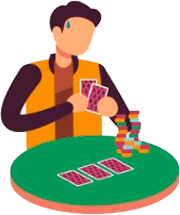A problem gambler feels an overwhelming have to gamble on line, visit casinos, and bet on sports. Addicts can’t control their behaviour and will keep on this self-destructive path, even if there are severe consequences for his or her personal lives. This article talks about four interesting facts about gambling addiction and recovery.
Four Interesting Facts About Gambling Addiction and Recovery
Page contents
1. Problem Gambling Is a Behavioural Addiction
Mental medical researchers and scientists have identified problem gambling as a behavioural addiction.  Gambling addicts show similar changes in behaviour and brain activity as drug users and alcoholics. Defective brain functioning may possibly play a central role in the self-destructive behaviour of problem gamblers.
Gambling addicts show similar changes in behaviour and brain activity as drug users and alcoholics. Defective brain functioning may possibly play a central role in the self-destructive behaviour of problem gamblers.
Development of Gambling Addiction
The more the individual gambles, the more their addiction will grow. Brain imaging studies and tests have unmasked that gambling activates the gambler's brain's reward system and provides them a top, in the same way, drugs do for drug addicts.
It’s already been proven that you’re at greater threat of developing an addiction if any of your family members have substance addiction problems.
Impaired Brain Function
The prefrontal cortex controls impulsivity, cognitive control, and is involved with decision making. Studies show this brain region is less active in gambling and drug addicts than people without these issues. Problem gamblers tend to be also impulsive, and it appears likely that they could struggle to control their impulses because of the paid off functioning of the prefrontal cortex.
The brains of addicts also process risk and reward incorrectly, as well as current versus long-term consequences.
Addicts Use Gambling as a Coping Mechanism
Many addicts also have a problem with mood disorders, such as for instance depression and anxiety, that causes people to feel negative about themselves. Gambling is a coping mechanism for them as it helps them escape the daily realities, which increases their anxiety.
2. Behavioural Treatment Can Help Gambling Addicts
Treatment approaches are often like those used for drug and alcohol addicts. Cognitive and behavioural treatment can help problem gamblers realize that they need to change their contemplating gambling. The therapy encourages them to reevaluate risky thinking, such as for example trying to predict the results of their next bet, based on previous ones' successes.
Behavioural treatment encourages people to change their behaviour and environment to create it harder for them to gamble, e. g. to limit their use of cash. Motivation also plays an important role in overcoming a gambling problem. Motivational enhancement methods enable individuals to know the way it affects their lives and how to manage their mixed feelings about stopping.
3. Many Gambling Addicts Are Women
The number of female gambling addicts is increasing and in some age ranges, now even outnumbers men. Treatment should remember the fact that women get dependent on gambling for different reasons than men.
- Significant life style changes such as for example divorce and retirement become triggers for women to develop a compulsive gambling problem.
- Most women gamble as a type of escape from overwhelming circumstances. Winning money isn't a significant motivating factor for women.
- Women are usually older than men when they start gambling, but they can develop a problem faster.
- Women react to gambling cues and ads more than men.
- The biggest group of women who seek help for gambling addiction is between the ages of 40 and 60.
Female gambling addicts have a higher rate of mood disorders and have frequently also suffered physical abuse.
4. Preventing the Problem
The focus is often on treatment and quitting for gambling addicts. What if they can prevent creating a problem in the first place? In the hope of preventing the problem before it starts, gamblers must certanly be encouraged to accomplish the following:

Set a Money Limit
If you should be likely to a land-based casino, leave your cards at home and bring a cash amount. Also, set a plan for on line gaming. Decide how much you'd invest in an evening's entertainment and only spend that amount. Set an upper limit; this is the amount you would be pleased to leave with should you find yourself ahead.
Know the Game to Control Your Bets
It's essential to understand the games, to help you control just how much without a doubt, even if you cannot control a game's outcome. Slots enable you to bet on many lines, and you will end up betting significantly more than you intended and run out of money fast. This might be a temptation to obtain additional money to play for longer.
Set a Time Limit
Set a reminder on your phone for when you intend to stop playing or leave the land-based casino.
Focus on Entertainment
Be prepared to spend all of the money you have budgeted, as this could keep you in the mindset that it’s entertainment. You will be less inclined to attempt to win back your money by playing even more.
Understand the Games Are Random
Activities such as for instance tracking previous results won't assist you to win. An RNG (random number generator) computer chip determines the outcomes of slots.Final Thoughts
Gambling could be a harmless type of entertainment, nonetheless it could also be used to deal with daily life stresses like alcohol or drugs. If you should be concerned that gambling is harming your life, your local problem gambling helpline for advice.

